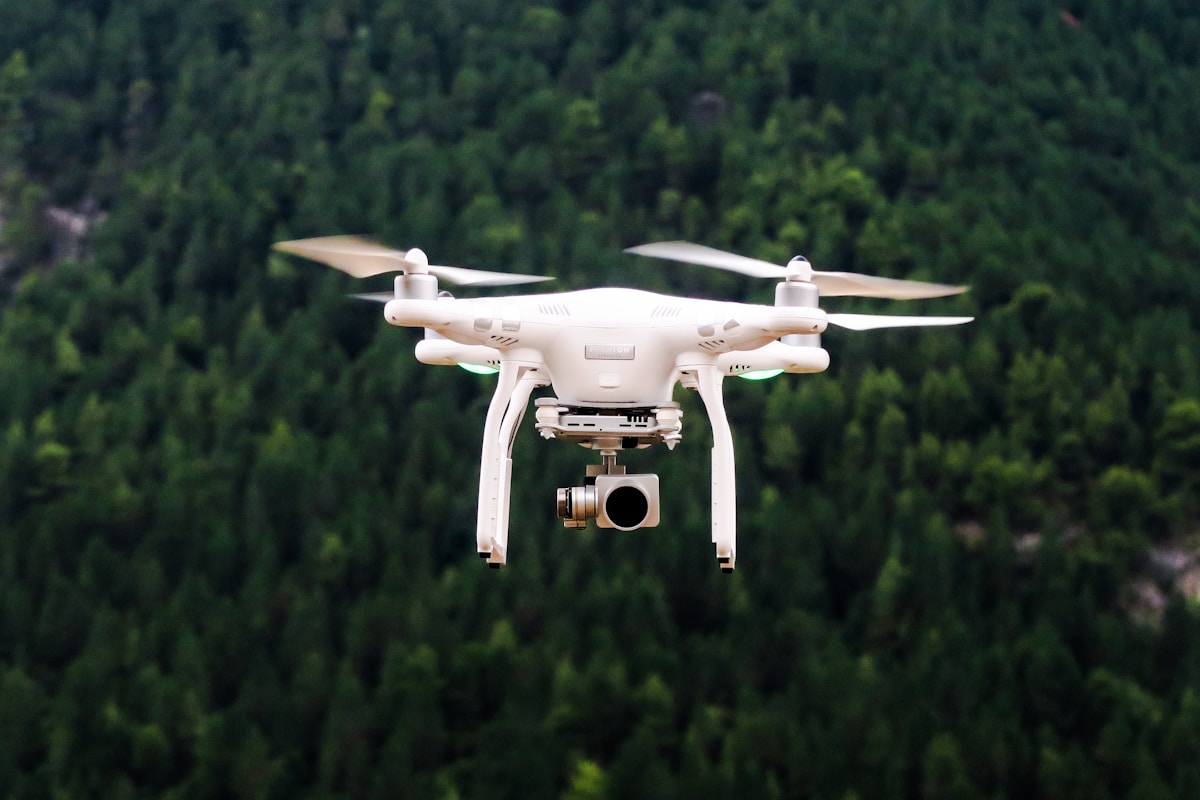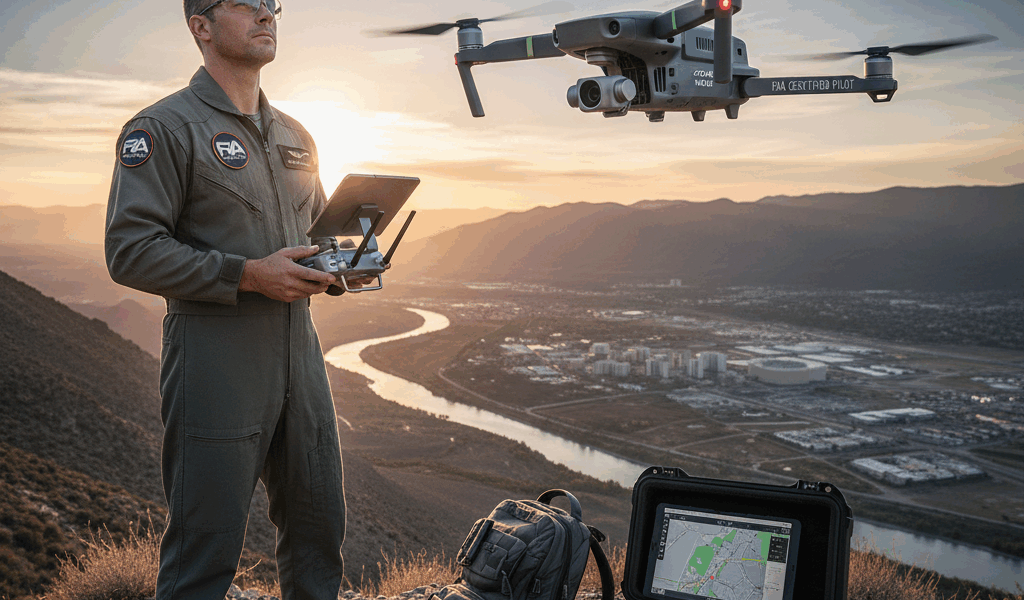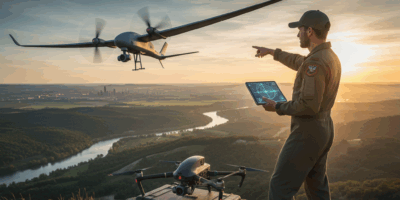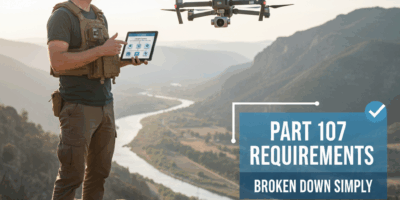Commercial drone pilot certification and responsibilities has gotten complicated with all the conflicting advice, outdated information, and overwhelming details flying around. As someone who’s been deeply involved in the Part 107 and drone operation world for years, I learned everything there is to know about this subject. Today, I will share it all with you.
That’s what makes this topic endearing to us certificated pilots – it gives us practical knowledge we can actually use in the field.
Probably should have led with this section, honestly, but let me break down what you really need to know:
Choose the Right Certification

To operate a drone commercially, you need the Remote Pilot Certificate, also known as Part 107. This certification covers various aspects of drone operation, from basic handling to airspace regulations.
Meet the Basic Requirements
- You must be at least 16 years old.
- You need to understand English, including reading, writing, and speaking.
- Physical and mental fitness is necessary to operate a drone safely.
Study for the Test
The Part 107 test covers various topics. You can find study guides and training courses online to help you prepare. Some key areas to focus on include:
- FAA regulations
- Airspace classifications
- Weather effects on drones
- Emergency procedures
- Drone maintenance
Many online resources, including YouTube tutorials and practice exams, can help you study. Enrolling in a formal course might also be beneficial if you prefer structured learning.
Schedule and Take the Test

Once you feel prepared, you can schedule your test at an FAA-approved knowledge testing center. The test consists of 60 multiple-choice questions, and you need a 70% or higher to pass.
Submit Your Application
After passing the test, you’ll need to complete the FAA’s online application process. This includes submitting your test results and undergoing a background check. The TSA conducts this check to ensure no security risks.
Get Your Remote Pilot Certificate
Once approved, you’ll receive a temporary certificate to use while waiting for the permanent one. This typically takes a few weeks. Keep your temporary certificate accessible during this time, as you’ll need it if questioned about your qualifications.
Maintain Your Certification
To keep your certification valid, you must pass a recurrent test every 24 months. This ensures you are up to date with the latest regulations and best practices.
Consider Additional Training
The drone industry constantly evolves, and additional training can help you stay ahead. Specialized courses are available in various fields like aerial photography, mapping, and inspection.
Comply with Other Legal Requirements
Besides FAA regulations, state and local laws might apply to drone operations. Always check local legislation before flying your drone.
- Some states require additional permits.
- Noise ordinances in residential areas.
- Privacy laws when capturing images or video.
Join a Community
Being part of a drone community can provide valuable support and networking opportunities. Online forums, local clubs, and social media groups are good places to start. Engaging with others can offer insights and advice that you might not find in textbooks.
Practice, Practice, Practice
Experience is a great teacher. Regularly flying your drone will help you become more comfortable with controls and handling. Practice in various conditions to understand how weather affects your drone’s performance.
Set up small projects to enhance your skills. You could document a local event, create a short film, or volunteer for community projects. Practical experience will build your confidence and improve your proficiency.
Stay Informed About Industry Trends
The drone landscape is ever-changing. Technological advancements and regulatory changes occur frequently. Subscribe to industry newsletters and follow relevant blogs and news outlets to stay updated.
Attending conferences and trade shows can also be beneficial. These events offer a glimpse into the latest innovations and provide networking opportunities with other professionals.
Invest in Quality Equipment
The right equipment can make a significant difference. While starting with a basic model is fine, upgrading as you gain experience is beneficial. Look for features like advanced GPS, better cameras, and longer battery life.
Don’t forget accessories like extra batteries, propellers, and carrying cases. These can extend your flight time and ensure you’re ready for various situations.
Create a Safety Checklist
Safety is paramount in drone operation. A safety checklist helps ensure you don’t overlook critical steps. Your checklist might include:
- Inspecting the drone for damage
- Confirming GPS lock
- Checking battery levels
- Assessing weather conditions
- Verifying that the flight zone is clear
Regularly updating your checklist based on new experiences and insights can help maintain safety standards.
Document Your Flights
Keeping a log of your flights is good practice. Note details like location, flight time, weather conditions, and any issues encountered. This documentation can be invaluable for troubleshooting problems and tracking your progress.
Explore Job Opportunities
Certification opens up various career paths. Commercial drone pilots are needed in sectors like real estate, agriculture, construction, and public safety. Look for job listings on specialized websites and job boards.
Freelancing is another option. Platforms like Upwork and Fiverr offer opportunities to connect with clients seeking drone services. Building a portfolio showcasing your skills can attract potential employers or clients.
Boost Your Marketability
Acquiring additional certifications or skills can make you more attractive to employers. Consider learning about video editing, GIS (Geographic Information System), or advanced photography techniques. These complementary skills can differentiate you in a competitive field.
Get Insurance
Insurance protects you from potential liabilities. Several companies offer policies tailored to drone operators. Coverage usually includes damage to the drone, third-party liability, and data protection.
Research different providers and understand what each policy covers. Comparing quotes and reading reviews can help you select the right insurance for your needs.
Network with Industry Professionals
Building connections can provide insights and open doors to opportunities. Attend industry events, join professional organizations, and participate in online forums. Networking helps you stay informed and may lead to job offers or collaborations.
Monitor Your Progress
Regularly assess your skills and knowledge. Seek feedback from peers and mentors to identify areas for improvement. Continuously refining your abilities keeps you competitive and prepared for new challenges.



